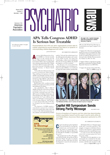Two recent reports offer ammunition for APA’s efforts to convince Congress to pass S 543, the Mental Health Equitable Treatment Act.
On October 2 the National Mental Health Association released results of a telephone survey about public attitudes toward parity in insurance coverage for mental health care. These were among the survey’s findings:
• Seventy-nine percent of respondents said that they would support parity legislation even if it increases their health insurance premiums by $1 a month. Fifty-one percent said they strongly support such legislation. This finding was consistent among respondents in all age groups.
• Sixty-four percent of respondents said insurance companies should provide coverage for mental illness that is equal to coverage for physical illness; 18 percent said that the coverage should be greater for mental illness; 10 percent said coverage should be less for mental illness.
The Opinion Research Corporation conducted the survey in September. Completed interviews were weighted for age, sex, geographic region, and race.
Claims Data Support Parity
On September 16 the American Managed Behavioral Healthcare Association (AMBHA) released an analysis of insurance claims that showed that 85 percent of billed mental health claims are for the treatment of serious mental illness (SMI).
For purposes of the analysis, the AMBHA excluded 70 mental health disorders and conditions listed in the Diagnostic and Statistical Manual of Mental Disorders, 4th Edition (DSM-IV) from its definition of SMI. For example, adjustment, sleep, and gender identity disorders were excluded.
Claims for substance abuse treatment were also excluded because they are not covered by the proposed legislation.
The analysis was based on 2001 data from 13 million mental health claims to managed care companies that cover almost 60 million people. The mental health claims totaled more than $3 billion in billings.
In a written statement, Pamela Greenberg, AMBHA’s executive director, said, “These data correspond to the experience of MBHOs [managed behavioral health care organizations] over the years. People with less serious mental disorders are not usually heavy users of the system.”
According to the statement, limiting the scope of parity legislation to a subcategory of mental illnesses would increase administrative costs. AMBHA members report that it would not be cost-effective for employers, health plans, psychiatrists, and mental health professionals if they had to take time to determine whether a disorder is covered.
Use Relates to Severity
The AMBHA assertion that most of the cost of mental health claims is attributable to SMI is supported by the Congressional Budget Office (CBO) (Psychiatric News, June 21).
In 2001 the CBO estimated the total cost for the parity bill, S 543, to be a .9 percent increase in premiums.
In a May 22 memo, the CBO stated that the estimate was based on the assumption that the bill would require affected group health plans to cover all mental illnesses listed in the most recent edition of the DSM, with the exception of substance abuse disorders.
Almost all of the cost increase associated with mental health parity results from increases in payments for the treatment of people suffering from severe mental illness, according to the CBO.
Darrel Regier, M.D., director of APA’s Office of Research and executive director of the American Psychiatric Institute for Research and Education, told Psychiatric News, “As the CBO pointed out, and insurance companies have long known, it is easier to control costs of less-severe mental illness. The recent CBO analysis laid to rest the specious argument that covering all the DSM [diagnoses] would open the floodgates in terms of cost.”
Earlier this year President George W. Bush endorsed mental health parity, but did not specify which mental illnesses he would like to see covered. House Republican leaders contend that requiring mental health coverage for all DSM disorders would drive up the health care costs for employers and employees (Psychiatric News, May 17).
In July Regier testified on behalf of APA about parity to the House Energy and Commerce Subcommittee on Health. He said, “Parity opponents know full well that DSM requires evidence of clinically significant impairment that would be fully protected under the House and Senate parity bills. The debate over DSM is palpably false and designed to distract Congress from the real issue: blatant discrimination against patients with mental illness” (Psychiatric News, August 3).
The survey results and related material are posted on the NMHA Web site at www.nmha.org. The text of the Mental Health Equitable Treatment Act can be accessed at http://thomas.loc.gov/ by searching on the bill number, S 543. ▪
